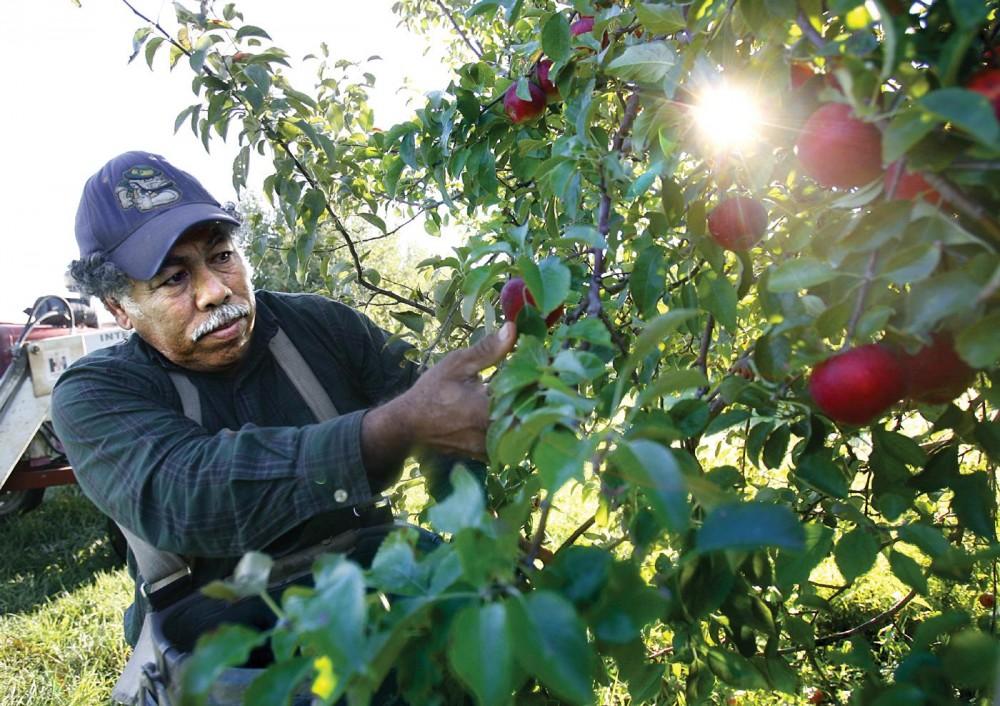Migrant work inspires prof

With the morning sun as a guide, migrant worker Manuel R. Lopez harvests the annual apple crop at Tuttle Orchards in Greenfield. Manuel is one of five Hispanic migrant workers who make a living at the orchard during Hancock County’s harvest season.
Apr 15, 2010
Overcrowded, unsanitary living conditions are an unchangable obstacle for many migrant workers in Michigan, something Grand Valley State University Spanish professor Natalia Gómez is working to change.
A board member of the Michigan Migrant Legal Assistance Project since 2001, Gómez said the issue had intrigued her since she came to West Michigan. After meeting a board member of the MMLAP and visiting a labor camp in Traverse City, the interest transformed into a passion.
“It became something I really believe I have to do,” she said. “I didn’t have any doubts that I wanted to be a part of it.”
A 2010 report issued by the the Michigan Civil Rights Commission last month estimated there are almost 91,000 migrant and seasonal workers in the U.S. Michigan’s migrant workers farm almost 58 percent of the $6.69 billion worth of crops Michigan produces each year, but they continue to live and work in destitute conditions.
“Alternative housing is typically not available to migrant farmworkers, as their poverty, the rural location of their work sites and the short duration of their stay in a given area make traditional housing impractical or unattainable,” the report read.
The treatment of migrant workers, especially children, is a huge embarassment, Gómez said.
“We’re always concerned about human rights in other countries, but we need to look at ourselves too,” she said. “To me it’s not acceptable for a child under 12 to be working long hours in unsafe conditions.”
Gómez brings the issue into her classroom, inviting speakers and taking students in her Latino Civilization and Culture class to visit migrant camps in Kent County. She said she hopes the experiences will make her students more open minded.
“It’s so difficult to see that they don’t have the minimum conditions that they should,” she said. “Students are bewildered, trying to understand how these conditions can be legal. They want to know how they can help.”
One student especially touched by Gómez’s passion is James Schmidt, who took her Composition and Conversation II class in the fall of 2007. Schmidt, who studied legal studies and Spanish at GVSU, now works as a paralegal with the MMLAP.
“I think she’s a great professor,” he said. “I was taking Spanish just to satisfy my language requirement and she really motivated me to really want to learn it. She gave me a kick in the behind to really learn the language and become fluent instead of just sitting in class.”
Schmidt said he was inspired after the organization’s director gave his class a presentation about migrant workers’ conditions.
“Hearing that the average family of four only makes $8,500 a year and seeing photos of the conditions, I was kind of moved,” he said. “I felt like I could contribute.”
He began volunteering with MMLAP, which eventually led to an internship and a job. Students such as Schmidt illustrate the impact Gómez has had.
“We have a philosophy of goals at Grand Valley,” she said. “We want to shape the lives of our students and educate them to be critical thinkers. This brings reality to my classroom.”
Although her second term as a board member will end this summer, Gómez’s passion will not. The April 2009 Professor of the Month said she plans to continue working with the organization and bringing attention to the issue in her classroom.
“I want to believe it will make (my students) better human beings,” she said. “I hope it will shape their lives in a way to better think about critical issues across the world, be open to diverse ideas, and understand that to make a point, you have to research and know the ins and outs of an issue.”





















